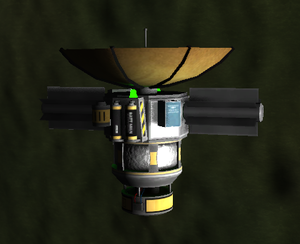Difference between revisions of "Ion-Powered Space Probe"
BlobKerman (talk | contribs) m (Fixed grammar; probe needs its own page too) |
m (corrected minor error) |
||
| Line 8: | Line 8: | ||
To power all electric systems, including the engine, two [[PB-NUK Radioisotope Thermoelectric Generator]]s are mounted on opposite sides. They are buffered by four [[Z-100 Rechargeable Battery Pack]]s. As the generators aboard don't generate enough electricity and some is needed to run the command module, the ion engine can only run up to 10% of its maximum thrust. This limits the maximum force applied by the engine to about 50 N or completely dry an acceleration about 0.08 m/s². | To power all electric systems, including the engine, two [[PB-NUK Radioisotope Thermoelectric Generator]]s are mounted on opposite sides. They are buffered by four [[Z-100 Rechargeable Battery Pack]]s. As the generators aboard don't generate enough electricity and some is needed to run the command module, the ion engine can only run up to 10% of its maximum thrust. This limits the maximum force applied by the engine to about 50 N or completely dry an acceleration about 0.08 m/s². | ||
| − | The probe is equipped with | + | The probe is equipped with three [[sensor]]s: A [[2HOT Thermometer]], a [[Double-C Seismic Accelerometer]], and a [[GRAVMAX Negative Gravioli Detector]] |
[[Category:Stock craft]] | [[Category:Stock craft]] | ||
Revision as of 15:39, 27 May 2014


The Ion-Powered Space Probe is a stock probe which utilizes the PB-ION Electric Propulsion System.
This probe requires a launcher to get into orbit, as the ion engine doesn't provide enough thrust. The Z-MAP Satellite launcher is capable of bringing this probe into orbit.
To power all electric systems, including the engine, two PB-NUK Radioisotope Thermoelectric Generators are mounted on opposite sides. They are buffered by four Z-100 Rechargeable Battery Packs. As the generators aboard don't generate enough electricity and some is needed to run the command module, the ion engine can only run up to 10% of its maximum thrust. This limits the maximum force applied by the engine to about 50 N or completely dry an acceleration about 0.08 m/s².
The probe is equipped with three sensors: A 2HOT Thermometer, a Double-C Seismic Accelerometer, and a GRAVMAX Negative Gravioli Detector